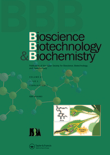
BIOSCIENCE BIOTECHNOLOGY AND BIOCHEMISTRY
Scope & Guideline
Bridging Biology and Technology for Tomorrow's Solutions
Introduction
Aims and Scopes
- Biotechnological Innovations:
The journal emphasizes the development and application of biotechnological methods for various purposes, including agriculture, medicine, and environmental sustainability. - Biochemical Pathways and Mechanisms:
Research articles often explore biochemical pathways, enzyme functionality, and metabolic processes, providing insights into cellular and molecular mechanisms. - Natural Product Chemistry:
The journal publishes studies on the isolation, characterization, and bioactivity of natural products, particularly those derived from plants, fungi, and microorganisms. - Microbial Biotechnology:
A significant focus is placed on the use of microorganisms for biotechnological applications, including enzyme production, bioremediation, and fermentation processes. - Plant-Microbe Interactions:
The journal features research on the interactions between plants and microorganisms, highlighting their roles in agriculture and ecosystem health.
Trending and Emerging
- Synthetic Biology and Genetic Engineering:
There is an increasing emphasis on synthetic biology and genetic engineering techniques to create novel organisms and metabolic pathways for specific applications. - Microbiome Research:
Research into microbiomes, particularly their role in health, disease, and agriculture, is gaining traction, highlighting the importance of microbial communities. - Bioinformatics and Computational Biology:
The integration of bioinformatics tools and computational approaches in biological research is on the rise, providing new insights into complex biological data. - Sustainable Biotechnology:
Research focused on sustainability, including bioprocess optimization and renewable resource utilization, is becoming more prominent as global challenges necessitate environmentally friendly solutions. - Phytochemistry and Medicinal Plants:
There is a growing interest in the bioactive compounds derived from plants and their potential therapeutic applications, reflecting a trend towards natural product research.
Declining or Waning
- Traditional Fermentation Processes:
Research related to traditional fermentation methods has decreased, possibly due to a shift towards more innovative biotechnological approaches and mechanistic studies. - Classical Plant Breeding Techniques:
As the field moves towards genetic engineering and molecular breeding techniques, traditional breeding methods are receiving less attention in favor of more advanced methodologies. - Basic Physiological Studies:
While foundational physiological research is important, there seems to be a waning focus on purely descriptive physiological studies without clear biotechnological applications.
Similar Journals
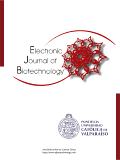
ELECTRONIC JOURNAL OF BIOTECHNOLOGY
Empowering Global Collaboration in Biotechnology ResearchThe Electronic Journal of Biotechnology is a premier Open Access journal published by Pontificia Universidad Catolica de Valparaiso, Chile, dedicated to advancing the fields of applied microbiology and biotechnology. With its inception in 1998 and an unwavering commitment to sharing knowledge, the journal has garnered a respectable ranking within the Q3 quartile for both its biotechnology and applied microbiology categories as of 2023, reflecting its significance in the academic community. Researchers and professionals will find its editorial rigor complemented by a robust platform for disseminating innovative findings, fostering collaboration, and driving forward biotechnology discussions. Given its inclusive approach, having transitioned to Open Access in 2014, the journal ensures that research is accessible to a global audience, making it a valuable resource for students, academics, and industry practitioners alike. Through the publication of original research, reviews, and critical insights, the Electronic Journal of Biotechnology aims to bridge the gap between scientific discovery and practical application, ultimately contributing to advancements in health, agriculture, and environmental sustainability.
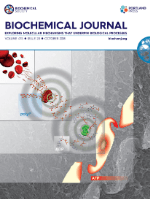
BIOCHEMICAL JOURNAL
Fostering Innovation in Biochemistry and BeyondBIOCHEMICAL JOURNAL, published by Portland Press Ltd, stands as a leading publication in the fields of Biochemistry, Cell Biology, and Molecular Biology, reflecting a commitment to advancing scientific knowledge since its inception in 1945. With a distinguished Q1 ranking across these categories and impressive Scopus rankings, the journal serves as an invaluable resource for researchers, professionals, and students alike, facilitating critical discoveries and innovative research practices. Although not currently offering open access, the journal provides a platform for high-quality peer-reviewed articles, ensuring rigorous standards in the dissemination of biochemical research. Spanning over seven decades and continuing through to 2024, the BIOCHEMICAL JOURNAL fosters an environment where cutting-edge biochemical research thrives, supporting the global scientific community's efforts to address complex biological questions and enhance our understanding of fundamental cellular processes.
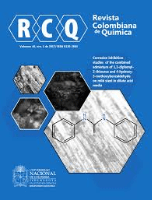
Revista Colombiana de Quimica
Bridging Ideas and Discoveries in Chemistry.Revista Colombiana de Quimica, published by the Universidad Nacional de Colombia, Departamento de Química, is a distinguished open access journal that has been serving the chemistry community since 1971. With an ISSN of 0120-2804 and an E-ISSN of 2357-3791, this journal presents a platform for researchers, professionals, and students to share and disseminate their findings in the field of chemical sciences. Positioned in the Q4 quartile in the 2023 rankings, this journal focuses on a diverse spectrum of topics within general chemistry, cultivating a rich discourse among scholars and practitioners in Colombia and beyond. Although the journal currently ranks 294 out of 408 in the field, its commitment to open access research ensures that valuable scientific knowledge is accessible to a wider audience, thus facilitating collaboration and advancement in the chemical sciences. As it converges from 2008 to 2022, the Revista Colombiana de Quimica remains a vital resource for anyone looking to contribute to or stay abreast of developments in chemistry.

JOURNAL OF PLANT BIOCHEMISTRY AND BIOTECHNOLOGY
Nurturing Sustainable Practices through Plant Science ResearchJOURNAL OF PLANT BIOCHEMISTRY AND BIOTECHNOLOGY, published by SPRINGER INDIA, is a leading publication dedicated to advancing research in the fields of plant biochemistry, biotechnology, agronomy, and crop science. With an ISSN of 0971-7811 and E-ISSN 0974-1275, the journal encompasses a wide range of studies aimed at enhancing our understanding of plant biological processes and their applications in agriculture and biotechnology. It has achieved a noteworthy Q2 ranking in Agronomy and Crop Science and Plant Science, as well as a Q3 ranking in Biotechnology, reflecting its quality and relevance in contemporary research. Notably, the journal ranks #166 in Plant Science and #133 in Agronomy, both falling in the top 67th percentile. With a rich history spanning from 1992 to 2024, the journal is committed to providing open access to innovative research findings that bridge the gap between laboratory discoveries and their practical applications in sustainable agriculture. Researchers, professionals, and students will find a wealth of knowledge and inspiration to advance their work in the dynamic field of plant sciences at this esteemed journal.

BIOTECHNOLOGY AND BIOPROCESS ENGINEERING
Fostering Collaboration in the World of BiotechBIOTECHNOLOGY AND BIOPROCESS ENGINEERING, published by the Korean Society for Biotechnology and Bioengineering, is a prominent journal in the fields of applied microbiology, biotechnology, bioengineering, and biomedical engineering. Since its inception in 1996, this journal has served as a vital platform for researchers and professionals, facilitating the dissemination of cutting-edge research and innovative applications related to bioprocesses and biotechnology systems. With an ISSN of 1226-8372, this journal is ranked within the Q3 quartile across several categories, demonstrating its relevance and impact in the academic community. Although it operates under traditional access modalities, the journal strives to provide quality and timely insights into the advancements in bioprocess technology and microbial applications, fostering a collaborative environment for knowledge exchange. Notably, it is indexed with a respectable presence on Scopus, making it a valuable resource for students and professionals seeking the latest developments in biotechnology. For more details, kindly refer to the Korean Science Technology Center, #704 Yeoksam-Dong, Gangnam-Ku, Seoul 135-703, South Korea.

Annual Review of Biochemistry
Connecting Past Discoveries with Future InnovationsAnnual Review of Biochemistry is a premier publication in the field of biochemistry, renowned for its comprehensive and critical reviews that collate significant advancements and insights since its inception in 1946. Published by Annual Reviews in the United States, this journal maintains a prestigious position within the academic community, boasting a Q1 ranking in the biochemistry category for 2023, with an impressive Scopus rank of #4 out of 438, placing it in the top 1% of its field. With a commitment to excellence, it serves as an essential resource for researchers, professionals, and students striving to stay at the forefront of biochemical research. While the journal does not operate on an open-access model, it continues to provide key insights and knowledge that fuel innovation and discovery in the life sciences. As it converges research from various eras up to 2024, Annual Review of Biochemistry remains a vital contributor to the development of molecular biology and genetics, catering to the needs of a diverse readership keen on advancing their understanding and expertise in biochemistry.

ChemBioEng Reviews
Unveiling Breakthroughs in Process ChemistryChemBioEng Reviews is a premier academic journal dedicated to advancing the fields of biochemistry, bioengineering, and chemical engineering. Published by WILEY-V C H VERLAG GMBH, this journal serves as an essential platform for researchers and professionals seeking to disseminate groundbreaking insights and innovations. With a remarkable impact factor and a solid reputation, it is ranked in the top quartile (Q1) across multiple disciplines, including Biochemistry, Bioengineering, and Industrial and Manufacturing Engineering. The journal's comprehensive scope covers the synthesis, analysis, and application of bioengineered solutions, making it a vital resource for anyone involved in process chemistry and technology. With an unwavering commitment to high-quality scientific discourse from 2014 to 2024, ChemBioEng Reviews is not only pivotal for the academic community but also contributes to industry advancements in filtration, separation processes, and the intersection of chemical and biological engineering.
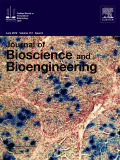
JOURNAL OF BIOSCIENCE AND BIOENGINEERING
Exploring the intersection of biology and technology.The JOURNAL OF BIOSCIENCE AND BIOENGINEERING, published by the SOC BIOSCIENCE BIOENGINEERING JAPAN, is an esteemed peer-reviewed journal dedicated to advancing knowledge in the fields of applied microbiology, biotechnology, and bioengineering. With its ISSN of 1389-1723 and E-ISSN 1347-4421, this journal has been providing a platform for innovative research since its inception in 1991, maintaining its relevance through periodic updates and a scope that encompasses various aspects of bioscience and engineering. The journal boasts a notable impact factor, reflecting its contributions to the Q2 and Q3 quartiles in relevant categories as of 2023, which positions it amongst the well-regarded publications in its field. Researchers and professionals can access its rich archive through open access options, ensuring wide dissemination of pivotal studies. With its address rooted in Osaka University, Japan, the journal serves as a vital resource for scientists and scholars committed to pushing the boundaries of biosciences and engineering.

APPLIED BIOCHEMISTRY AND BIOTECHNOLOGY
Pioneering Sustainable Solutions through BiotechnologyApplied Biochemistry and Biotechnology is a leading journal published by Springer, dedicated to advancing research in the interdisciplinary fields of biochemistry, biotechnology, and applied microbiology. Established in 1981, this peer-reviewed journal covers a wide range of topics that encompass innovative techniques, methodologies, and applications of biochemistry and biotechnology in medicine, environmental engineering, and molecular biology. With a Q2 ranking in several categories and an increasing impact factor, the journal demonstrates significant influence and credibility within the scientific community. While traditionally subscription-based, the journal offers avenues for open access through selective agreements, making high-quality research accessible to a broader audience. Researchers, professionals, and students alike will find Applied Biochemistry and Biotechnology to be an invaluable resource for the latest developments and applications in biochemistry and its related fields, aiding in the quest for sustainable solutions and novel biotechnological advancements.
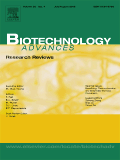
BIOTECHNOLOGY ADVANCES
Unleashing Potential through Biotechnology ResearchBIOTECHNOLOGY ADVANCES is a premier, peer-reviewed journal published by PERGAMON-ELSEVIER SCIENCE LTD, dedicated to advancing knowledge in the rapidly evolving fields of biotechnology and bioengineering. With an ISSN of 0734-9750 and an E-ISSN of 1873-1899, this esteemed journal covers a wide spectrum of topics relevant to applied microbiology, molecular biology, and biochemical innovation. Recognized for its academic rigor, it holds a distinguished position in the top quartile (Q1) in multiple categories, including Applied Microbiology and Biotechnology, Bioengineering, and Biotechnology, further evidenced by its high rankings in Scopus, where it ranks #3/127 in Applied Microbiology and Biotechnology and #7/311 in Biotechnology. Researchers and professionals in the field value the journal not only for its comprehensive coverage of cutting-edge research but also for its commitment to disseminating critical findings and fostering collaboration. While BIOTECHNOLOGY ADVANCES currently operates under a subscription model, its potential impact on future innovations in biotechnology cannot be overstated, making it an essential resource for anyone interested in the forefront of biotechnological advancements.